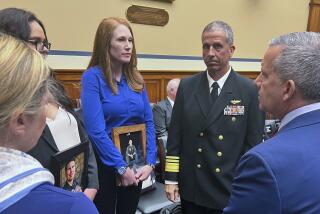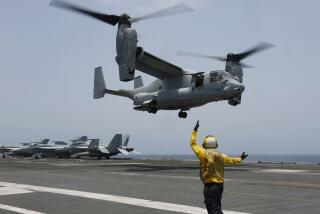New Leadership Could Breathe Life Into Osprey Program
- Share via
WASHINGTON — Three managers overseeing the Marine Corps’ beleaguered V-22 Osprey aircraft program will leave the project this year, a development that could make it easier for advocates to keep the program alive.
The Marines insist that none of the three is leaving because of the problems with the Osprey, an innovative aircraft that is the Marines’ top acquisition priority. Yet congressional aides and some nongovernment defense experts say the departures might help advocates in Congress and the administration argue that the project is making a fresh start and should be allowed to go forward.
The Osprey has rotors that tilt between horizontal and vertical positions, enabling the aircraft to take off like a helicopter but to cruise at the speed of an airplane.
The Marines want to buy 360 of the aircraft to replace aging helicopters from the Vietnam War era.
Public relations have become increasingly important to the program in the aftermath of crashes in April and December of last year that killed 23 Marines.
A blue-ribbon study panel is now conducting a broad review of the program’s effectiveness, safety and cost as the Pentagon inspector general separately probes allegations that Marine brass pressured subordinates to falsify maintenance data to make the Osprey look good.
Some members of Congress have acknowledged that the fraud allegations and fatalities have made it difficult, at the moment, to be a visible supporter of the program.
Meanwhile, as part of its effort to hold down future defense budgets, the Bush administration is looking for big-ticket aircraft programs to kill or pare.
Col. Nolan Schmidt, the program’s manager since 1997, is to retire from the Marines in June after being denied a promotion to brigadier general.
Lt. Gen. Fred McCorkle, who has been closely involved with the program as deputy Marine commandant for aviation, is also scheduled to retire this summer.
McCorkle’s No. 2, Brig. Gen. James Amos, has been recommended for promotion and is expected to begin a new assignment this summer.
U.S. officials say the Pentagon inspector general, as part of a fraud investigation, has looked at officials of the Osprey program.
But the Senate Armed Services Committee, which must vote on Amos’ promotion, has been sent a letter from the office of the assistant secretary of Defense for force management that says Amos is not under investigation, Senate aides said.
Lt. David Nevers, a Marine Corps spokesman, said the departures of the three are not connected with the Osprey’s problems. They were a fait accompli even before the first of the two accidents last year, he said.
Nevers said that it was not surprising that Schmidt was not promoted to brigadier general. There is keen competition for a small number of positions, he said, adding that it is infrequent that officers specializing in acquisition make the cut.
McCorkle had been scheduled to retire last year but was asked to stay on by the Marine commandant, Gen. James L. Jones Jr., the spokesman said.
The blue-ribbon study panel is due to report its findings to Secretary of Defense Donald H. Rumsfeld next month.
The panel is expected to call for some changes in the program, perhaps including additional testing that would delay the Osprey’s move to full-scale production.
The new round of tests, and the arrival of new managers, will give the Marines and Osprey supporters a chance to argue that the 19-year-old program is heading in a new direction, observers said.
“The Marines have an excellent opportunity here to completely change the cast of characters associated with the program and to get a new start,” said Loren Thompson, a longtime Osprey supporter who is chief operating officer at the Lexington Institute, a defense think tank in northern Virginia.
Critics of the Osprey have contended that program managers cut or postponed too many tests in the interest of reducing costs and to keep the program from falling further behind schedule.
They have raised questions about its handling in certain aerodynamic conditions, as well as its sensitive high-pressure hydraulic system.
More to Read
Sign up for Essential California
The most important California stories and recommendations in your inbox every morning.
You may occasionally receive promotional content from the Los Angeles Times.














